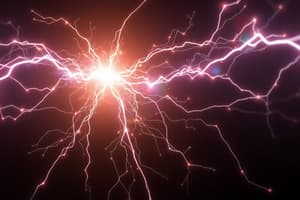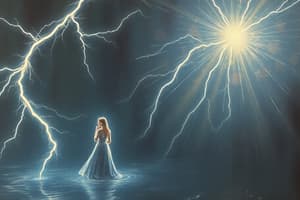Podcast
Questions and Answers
What is the magnitude of the charge of an electron?
What is the magnitude of the charge of an electron?
- 1.6 × 10^5 C
- 1.6 × 10^-19 C (correct)
- 1.6 × 10^18 C
- 1.6 × 10^-5 C
Why is it not possible to have a charge of 0.5e on a body?
Why is it not possible to have a charge of 0.5e on a body?
- Because charge is always attractive
- Because charge is always positive
- Because charge is quantized (correct)
- Because mass is conserved
What is the difference between electric charge and mass?
What is the difference between electric charge and mass?
- Mass is always positive, but charge can be negative
- Charge is always conserved, but mass is not
- Charge is quantized, but mass is not
- All of the above (correct)
How can a body become positively charged by friction?
How can a body become positively charged by friction?
What is a result of the conservation of charge during frictional charging?
What is a result of the conservation of charge during frictional charging?
What happens when two charges of the same sign interact?
What happens when two charges of the same sign interact?
Which of the following is the S.I. unit of charge?
Which of the following is the S.I. unit of charge?
What is true about the conservation of charge?
What is true about the conservation of charge?
Which statement correctly describes a point charge?
Which statement correctly describes a point charge?
What is the primary reason a charged particle produces an electric field?
What is the primary reason a charged particle produces an electric field?
Flashcards are hidden until you start studying
Study Notes
Electric Charge
- Electric charge is a property of matter that produces and experiences electrical and magnetic effects.
Types of Charges
- There are two types of charges in nature: positive and negative charges.
- Like charges repel each other, while opposite charges attract each other.
Unit and Dimensional Formula
- The SI unit of charge is the coulomb (C).
- 1 C = 10^6 μC, 1 μC = 10^(-6) C, 1 nC = 10^(-9) C.
- The CGS unit of charge is the esu, where 1 C = 3 × 10^9 esu.
- The dimensional formula for charge is [Q] = [AT].
Point Charge
- A point charge is a charge whose spatial size is negligible compared to other distances.
- Charge is a scalar quantity, meaning it can be added or subtracted algebraically.
- Charge is transferable and can be transferred from one body to another.
- Charge is always associated with mass, but mass can exist without charge.
- Charge is conserved, meaning it cannot be created or destroyed.
- The numerical value of an elementary charge is independent of velocity.
Properties of Charge
- Charge produces electric fields and magnetic fields.
- A charged particle at rest produces only an electric field, while a moving charge produces both electric and magnetic fields.
- An accelerated charge radiates energy in the form of electromagnetic waves.
- Charge is quantized, meaning it can only take on discrete values.
- The smallest unit of charge is the charge of an electron, which is -1.6 × 10^(-19) C.
Comparison of Charge and Mass
- Electric charge can be positive, negative, or zero, while mass is always positive.
- The charge carried by a body does not depend on its velocity, while mass increases with velocity.
- Charge is quantized, while the quantization of mass is yet to be established.
- Electric charge is conserved, while mass is not conserved and can be converted into energy.
- The force between charges can be attractive or repulsive, while the gravitational force between two masses is always attractive.
Methods of Charging
- A body can be charged by friction, which involves the transfer of electrons from one body to another.
- Friction can cause one body to become positively charged and the other negatively charged.
- Charging by friction involves the conservation of charge, resulting in equal amounts of positive and negative charges.
- Other methods of charging include electrostatic induction.
Studying That Suits You
Use AI to generate personalized quizzes and flashcards to suit your learning preferences.




